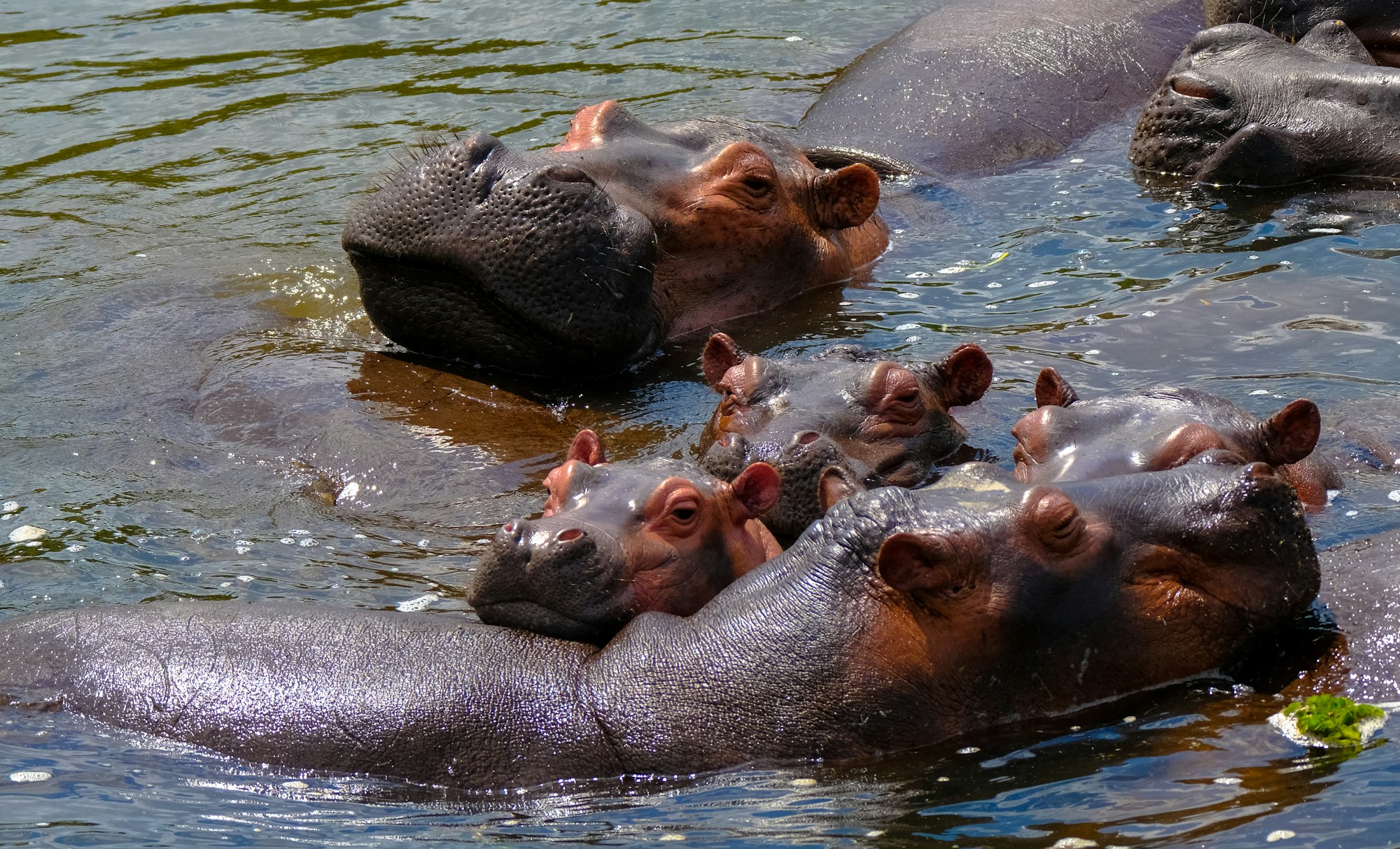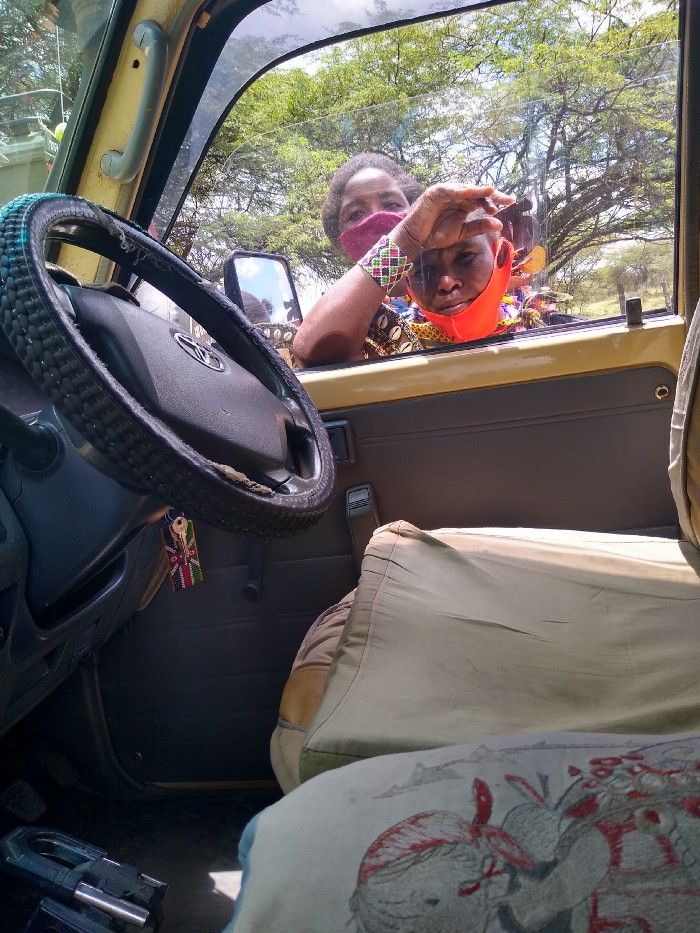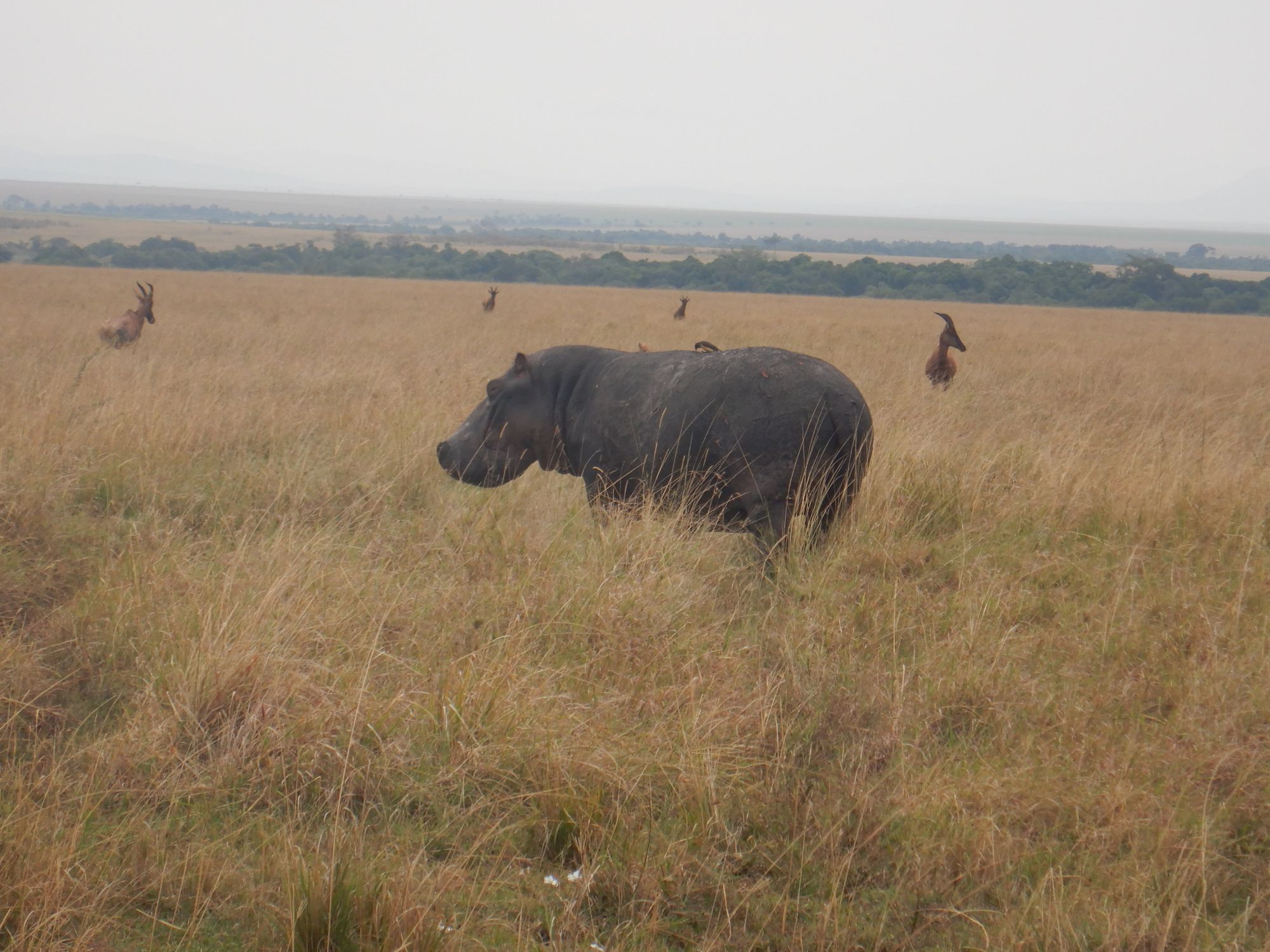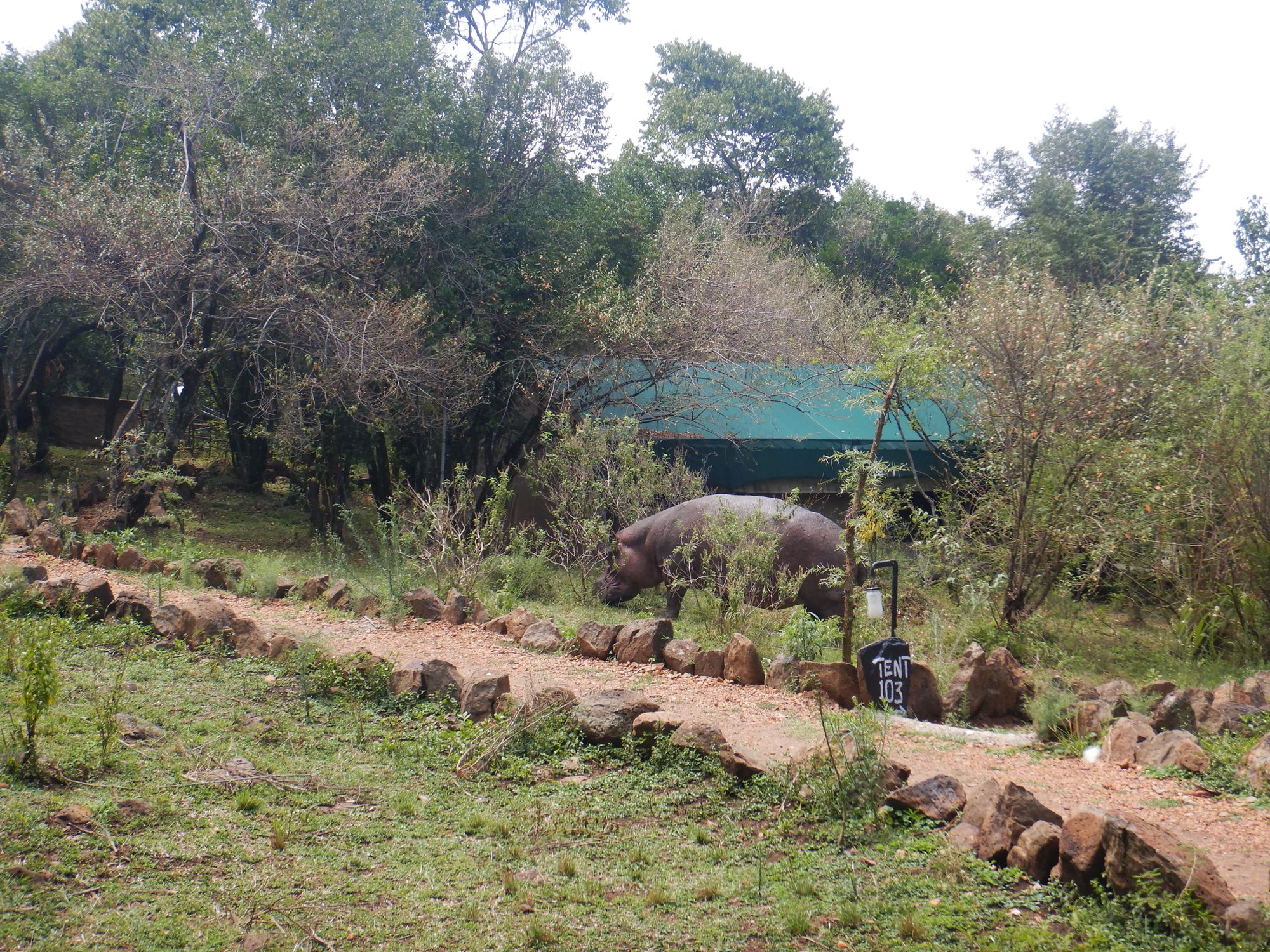
One of the last, great places on earth
Only the very earliest of the birds is up singing at three-thirty am, which is right now, Central Kenya time. I am in an expansive, luxurious tent situated far from one of the main gates in the great Maasai Mara, one of the most beautiful and abundant conservancies in Kenya.
I woke up yesterday morning in Nairobi at the Golden Tulip hotel, which is very close to the intense bustle of downtown Nairobi. The construction dust and massive traffic snarls affect everyone as the Chinese build a huge freeway, about which I have plenty of concerns about Kenya’s future. The Chinese are known to build their freeways right through the middle of game preserves without the slightest concern for animal migration patterns, but that’s another story. This is about Paradise, and Paradise deserves Her due.
The Mara, at least the camp where we are, is some five hours or so out of Nairobi. Simon, my guide from eTripAfrica, who was also my driver last year, explained to me what I was seeing along the way.
As I write this right now, I can hear the heavy splash of a hippo body entering the river which is mere feet from the zippered door of my tent. The animals are the most dangerous of all in Africa. They are night feeders, wandering onto land at night to graze, and returning to the cool and relative safety of the rivers at night. The “girls” talk and jabber and bubble all day, a sound I find immensely soothing.

Simon has worked as a guide and driver for close to seventeen years now. During those years and his many times to the Mara, one of his favorite places, he has watched the lands change. There used to be great migratory corridors along this highway, he said, and for miles you could see giraffe and zebra grazing the trees and open savannah.
Today, the land is fenced off, there are plenty of new homes, and the only grazing is done by cows, goat and sheep by the endless millions.
This creep is the inevitable end of the great herds over a long time, in my opinion, as people seem to be certain that hotels and commerce are more important than animal habitat.
In the eleven years I’ve been coming to Africa I’ve seen it too, and it breaks my heart. However tourism is a massive industry, and if animals disappear so does this critical source of revenue and untold jobs. Perhaps the best news is that our entrance fees as well as many concessions help pay for their future which is just one reason I keep coming back.
This is largely Maasai land, although the towns are full of people of all tribes. As you approach the gate, your vehicle is swarmed by gaily-dressed Maasai women who press against your window, demand your attention, call out prices and shove beaded necklaces and carved giraffes into your face.

It was hot,but Simon told me to roll up the window. FAST.
As he went to the park authority window with my passport, the women pressed their faces against the glass. “NO” is meaningless to these women, who are desperate for a sale, reminding me of the great play Glengarry Glen Ross, where desperation is the name of the game. They are very much in need. There are too many people, not enough work, and they do what they must.
Since my house is already full to the brim of such items, I won’t buy more. Besides, as with all other things, the prices of their goods have skyrocketed. When Simon and I stopped for coffee at a curio shop to allow the other guests to rush the gate to make the hotel lunch time, I had walked the shop to see what might be of interest. I picked up a dusty gourd to smell its insides, redolent of the fat it once carried.
An original, the shopkeeper said.
Three hundred and twenty five dollars American.
I burst into laughter, I couldn’t help it. I’ve paid about ten bucks for precisely the same thing not long ago. It really helps to know your goods, know your prices and not get fleeced. While I don’t blame folks for trying to make a living, that’s ludicrous, but people pay it. What Simon calls a “soft customer.”
We entered the gate, and promptly returned to Eden. Within mere seconds, there were Thompson gazelle and zebra grazing near the road and not a single sign of huts, commerce, sagging shops or lots of motorbikes.
My kind of heaven. Far away from most human intervention, at least for a while, anyway.
I didn’t know it yet, but it would be some hours before we reached our camp. Along the way, there would be some of life’s true treasures.
Here in the Mara, the roads are incredibly rough, carved out by untold numbers of jeeps, the harsh rains and animals which also use them. Off my left shoulder, a large thundercloud was already dumping sheets of rain on this parched ground, a welcome respite from long months without, but also a promise of muddy going.
Simon promptly spotted a herd of elephants, with three babies, making their way across the road. We pulled close, along with another Rover, and both watched and filmed these great animals as they grazed, studiously ignored us and made their way towards dusk.
Here, as elsewhere I have been so far this trip, there were great, sprawling herds of Cape buffalo. Calves of all ages, their horns beginning as wee bumps and slowly but surely growing into the lethal curves for which these animals are known, kept close to their cows’ sides. While they are, as all these animals are, accustomed to our vehicles, they are wary and protective.
The low brush which I remembered from my trip here via horse in 2020 (Offbeat Safaris, a superb horse riding excursion of extraordinary value, is situated not far from where we drove) hides lions, who seek out the shade during the heat of the day, as do many creatures. As the thundercloud crept nearer, the intense African sun softened a bit, and soon a dazzle of zebra made their way across the road in front of us.
There are different breeds of zebra,and if they intermingle, the result is a zebra of unique color, but infertile like mules.
It is now about five-thirty. The birds’ chorus out there on the heavily-treed hillside is loud and lovely. As the sun paints pink and orange in the east, the hippos have made their slow but determined way back to the river. Their chorus sounds like a quilting bee, all loud exclamations and girl gossip.Every so often you can hear a great exclamation of water as though one listener were expressing disbelief at her companion’s remarks.
As we drove our criss-cross pattern to spot more animals, Simon took out his binoculars to see where there were clumps of cars. This is high season; normally there are far more of them on these roads. The gate where we entered features hundreds of hotels, and the signs for them are everywhere, with the inevitable English mistakes. For example, there was one sign pointing to the Crocodile Camp,100 miles, follow the arrow.
Crocodile Camp is only 100 meters down that path, but one has to wonder how many frustrated clients gave up the ghost at that point, tired and dirty, and chose a closer alternative.
The mass of moving clouds began to catch up with us as we drove further into the park. The geography is characterized by mostly wide open plain, a few distant hills, dots of trees and plenty of low brush with lots of kite families perched on the dead treetops.
Simon spotted a large group of vehicles parked at one point, which in Africa is a sure sign of something big. Where we were, and at this time of day, that would likely be cheetahs. Four males, the subject of numerous documentaries, a tough bunch. They were once five, but there was a casualty. As it turned out this bunch was casually seated together, surrounded by some fifteen cars full of tourists with huge cameras. The cheetahs were scanning the horizon.
The zebra which had interested this bunch had already spotted them. That meant game over the cheetahs, who count on stealth and invisibility. The herd animals have long learned that a gathering of Rovers likely means a big cat or three or four, which acts as an efficient early warning system for the herds. That’s unfortunate, for it means that the cheetahs,who were hungry, had to pick up and move elsewhere. With any luck, beyond the reach and interest of our invading selves.
It is precisely this kind of intervention which, on one hand, makes it harder for those animals to live normal lives, but which also pays for their very existence. As the Maasai continue to encroach further on lands once populated by these great animals, as more hotels suck up the limited water for guests, as poachers are paid more and more by greedy clients, as more people prowl the plains and interfere with their habits, as more animals are forced into smaller and smaller places, one wonders how long they have. I surely do. These creatures have enough to deal with from Nature, and then there’s us.
That is why I come here. For Paradise is changing, and with it the animals painted on the nursery walls of our children. There are many good people doing the hard labor of protecting what is left, but the incredible pressures on these great creatures and their habitat are relentless.
Still and still.
There is so very much to see, and by the end of the day it is a matter of overwhelm. What you see here is nowhere else but in Africa. Raw, real, immediate. If you’ve dreamed, the way I see it, get your ticket now. The investment and the relatively minor inconveniences of the Covid tests are insignificant when you drive by thousands of migrating wildebeest, discover a full-bellied napping adult male lion beneath a tree, and marvel at, well, marvels.
There is a reason I return. The marvels. You never tire of them.
The rains came.The cheetahs, their prey alerted, turned. One drank deeply of the fresh puddle that appeared in front of our Rover. Then he inspected our left front tire, walked nonchalantly inches below my window as I filmed him, and slowly disappeared to join his mates as they trotted off for better game prospects. They were hungry.
And the, there was this:

Mara Eden was still a ways off. The advantage of this lovely camp, which I will describe in detail in another article, is its distance away from the main crush of hotels. While it is a bit more epic to reach, that is part of its charm. Simon pointed to a hill off in the distance.
A torch shone brightly.
If you are a fan of Out of Africa, you might recall that when Karen Blixen was preparing to leave her farm, her main servant Farah asked of her, How it will be with us, Sabu?
She replied, knowing the impossibility of her return, that as he had always done before, he was to set a great fire so that she would know where to find the camp as the night fell upon them.
When Simon pointed out the torch, that’s what came to mind. The bright light was clear from miles away. The rain, which had come down hard, caused us to slew sideways over and over. Off to our right, a solo topi mother was observing as her tiny baby was learning to run, making bigger and bigger circles through the tall grass. As he kicked and leapt in the joy belonging to the very young, cats would be waiting for him to exhaust himself. As soon as he did, he could become supper. The mother and baby were a long way away from the herd.
By the end of the night, it was entirely possible that this tiny calf would be cheetah dinner, the mother as well, unwilling to leave her baby, and paying the ultimate price with her life.
(In fact, the hunting cheetahs would take two babies that night: topi and warthog)
That drama would go unwitnessed. But the cheetahs, lean and hungry, would feed, and live to hunt another day. And, star in our photographs.
Simon and I drove into Mara Eden. It was nearly six. I had a mild headache, I was tired. The young men took my temperature, lifted my bags and we walked the long stone path into the camp.
In minutes I was inside a tent which offered greater luxuries and amenities than many, many hotels I have stayed in all over the world. The greatest gift, however, would be that I would drift off to sleep to the sound of the grunting, gossiping hippos, only a few feet away, and the sound of precious rain on my tent.
I am in Paradise,the original and last Eden. And I am beyond grateful.

Comments powered by Talkyard.